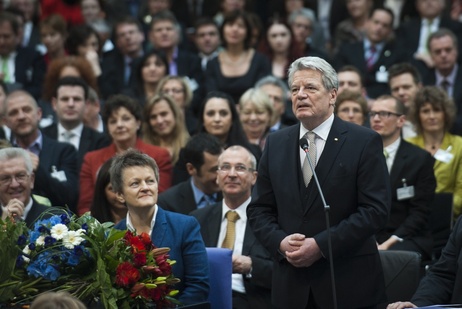Joachim Gauck is the eleventh President of the Federal Republic of Germany. On 18 March 2012, the Federal Convention elected the former GDR civil rights activist, who gained more than 80 per cent of the vote in the first ballot. The 72 year old received 991 out of 1228 valid votes. By formally accepting his election, Gauck officially took up office with all the rights and obligations that entails. The swearing in ceremony before the Members of the Bundestag and Bundesrat was on 23 March 2012.
In a short address to the Federal Convention, Gauck recalled the first free elections to the People’s Chamber of the GDR 22 years ago: “At that moment, I was filled not only with joy but also with the certainty that I would never ever miss a chance to vote in an election.”
More information on the election of the Federal President
The Federal President is elected by the Federal Convention, which is convened by the President of the German Bundestag. He is responsible for preparation and organization prior, during and after the Convention. The Federal Convention consists of the Members of the Bundestag and an equal number of members elected by the parliaments of the Länder.
Electing the Federal President is the sole task of the Federal Convention. The details of the election are governed by the Presidential Election Act, which is based on Article 54 (7) of the Basic Law.
The Federal President must be a German national, be entitled to vote in Bundestag elections and have attained the age of forty. The term of office is five years. Re election for a consecutive term is permitted only once (Article 54 of the Basic Law).
The Federal President may not be a member of the government or of a legislative body of the Federation or of a Land (Article 55 (1) of the Basic Law). Nor may the Federal President hold any other salaried office, or engage in any trade or profession, or belong to the management or supervisory board of any enterprise conducted for profit (Article 55 (2) of the Basic Law).
On assuming office, the Federal President takes an oath before the assembled Members of the Bundestag and the Bundesrat (Article 56 of the Basic Law).
The Bundestag has sole responsibility for the election and the Federal Convention. For more information from the Bundestag click here.


